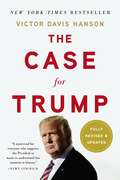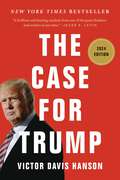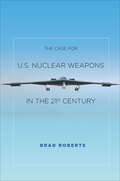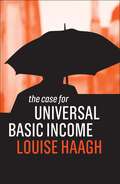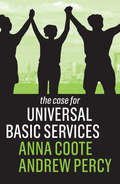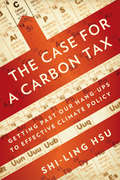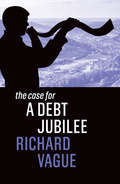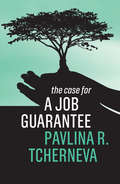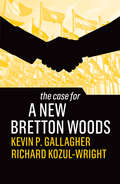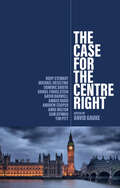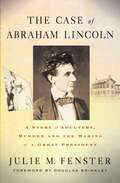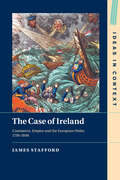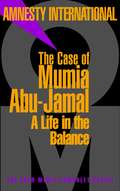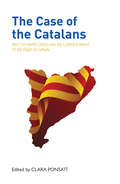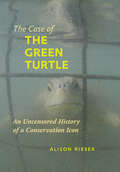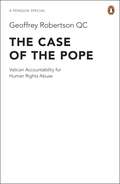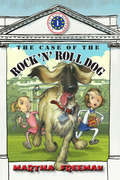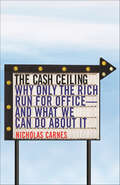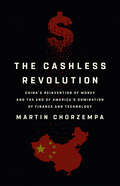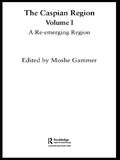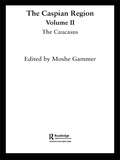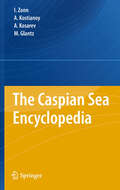- Table View
- List View
The Case for Trump
by Victor Davis HansonFrom an award-winning historian and regular Fox contributor, the true story of how Donald Trump has become one of the most successful presidents in history -- and why America needs him now more than ever <P><P> In The Case for Trump, award-winning historian and political commentator Victor Davis Hanson explains how a celebrity businessman with no political or military experience triumphed over sixteen well-qualified Republican rivals, a Democrat with a quarter-billion-dollar war chest, and a hostile media and Washington establishment to become president of the United States -- and an extremely successful president. <P><P>Trump alone saw a political opportunity in defending the working people of America's interior whom the coastal elite of both parties had come to scorn, Hanson argues. <P><P>And Trump alone had the instincts and energy to pursue this opening to victory, dismantle a corrupt old order, and bring long-overdue policy changes at home and abroad. <P><P>We could not survive a series of presidencies as volatile as Trump's. But after decades of drift, America needs the outsider Trump to do what normal politicians would not and could not do. <P><b>A New York Times Bestseller</b>
The Case for Trump
by Victor Davis HansonA New York Times bestseller and &“a brilliant and bracing analysis&” (Mark R. Levin) of Donald Trump, his presidency, and his vision of America&’s future—now updated for 2024 In The Case for Trump, award-winning historian and political commentator Victor Davis Hanson explains how a celebrity businessman with no political or military experience triumphed over sixteen well-qualified Republican rivals, a Democrat with a quarter-billion-dollar war chest, and a hostile media and Washington establishment to become an extremely successful president. Trump alone saw a political opportunity in defending the working people of America&’s interior whom the coastal elite of both parties had come to scorn, Hanson argues. And Trump alone had the instincts and energy to pursue this opening to victory, dismantle a corrupt old order, and bring long-overdue policy changes at home and abroad. After decades of drift, America needed the outsider Trump to do what normal politicians would not and could not do. Now updated for the 2024 election with a comprehensive new introduction, this is the essential book on what Donald Trump means for America.
The Case for U.S. Nuclear Weapons in the 21st Century
by Brad RobertsThis book is a counter to the conventional wisdom that the United States can and should do more to reduce both the role of nuclear weapons in its security strategies and the number of weapons in its arsenal. The case against nuclear weapons has been made on many grounds--including historical, political, and moral. But, Brad Roberts argues, it has not so far been informed by the experience of the United States since the Cold War in trying to adapt deterrence to a changed world, and to create the conditions that would allow further significant changes to U.S. nuclear policy and posture. Drawing on the author's experience in the making and implementation of U.S. policy in the Obama administration, this book examines that real world experience and finds important lessons for the disarmament enterprise. Central conclusions of the work are that other nuclear-armed states are not prepared to join the United States in making reductions, and that unilateral steps by the United States to disarm further would be harmful to its interests and those of its allies. The book ultimately argues in favor of patience and persistence in the implementation of a balanced approach to nuclear strategy that encompasses political efforts to reduce nuclear dangers along with military efforts to deter them.
The Case for Universal Basic Income
by Louise HaaghAdvocated (and attacked) by commentators across the political spectrum, paying every citizen a basic income regardless of their circumstances sounds utopian. However, as our economies are transformed and welfare states feel the strain, it has become a hotly debated issue. In this compelling book, Louise Haagh, one of the world’s leading experts on basic income, argues that Universal Basic Income is essential to freedom, human development and democracy in the twenty-first century. She shows that, far from being a silver bullet that will transform or replace capitalism, or a sticking plaster that will extend it, it is a crucial element in a much broader task of constructing a democratic society that will promote social equality and humanist justice. She uses her unrivalled knowledge of the existing research to unearth key issues in design and implementation in a range of different contexts across the globe, highlighting the potential and pitfalls at a time of crisis in governing and public austerity. This book will be essential reading for anyone who wants to get beyond the hype and properly understand one of the most important issues facing politics, economics and social policy today.
The Case for Universal Basic Services (The Case For)
by Anna Coote Andrew PercyThe idea that healthcare and education should be provided as universal public services to all who need them is widely accepted. But why leave it there? Why not expand it to more of life’s essentials? In their bold new book, Anna Coote and Andrew Percy argue that this transformational new policy – Universal Basic Services – is exactly what we need to save our societies and our planet. The old argument that free markets and individual choice are the best way to solve pressing problems of poverty, inequality and environmental degradation has led us to catastrophe, and must be abandoned. The authors show that expanding the principle of collective universal service provision to everyday essentials like transport, childcare and housing is not only the best way of tackling many of the biggest problems facing the contemporary world: it’s also efficient, practical and affordable.Anyone who cares about fighting for a fairer, greener and more democratic world should read this book.
The Case for Vaccine Mandates
by Alan DershowitzIn The Case for Vaccine Mandates, Alan Dershowitz—New York Times bestselling author and one of America&’s most respected legal scholars—makes an argument, against the backdrop of ideologically driven and politicized objections, for mandating (with medical exceptions) vaccinations as a last resort, if proved necessary to prevent the spread of COVID. Alan Dershowitz has been called &“one of the most prominent and consistent defenders of civil liberties in America&” by Politico and &“the nation&’s most peripatetic civil liberties lawyer and one of its most distinguished defenders of individual rights&” by Newsweek. He is also a fair-minded and even-handed expert on civil liberties and constitutional rights, and in this book offers his knowledge and insight to help readers understand how mandated vaccination and compulsion to wearing masks should and would be upheld in the courts. The Case for Vaccine Mandates offers a straightforward analytical perspective: If a vaccine significantly reduces the threat of spreading a serious and potentially deadly disease without significant risks to those taking the vaccine, the case for governmental compulsion grows stronger. If a vaccine only reduces the risk and seriousness of COVID to the vaccinated person but does little to prevent the spread or seriousness to others, the case is weaker. Dershowitz addresses these and the issue of masking through a libertarian approach derived from John Stuart Mill, the English philosopher and political economist whose doctrine he summarizes as, &“your right to swing your fist ends at the tip of my nose.&” Dershowitz further explores the subject of mandates by looking to what he describes as the only Supreme Court decision that is directly on point to this issue; decided in 1905, Jacobson v. Massachusetts involved a Cambridge ordinance mandating vaccination against smallpox and a fine for anyone who refused. In the end, The Case for Vaccine Mandates represents an icon in American law and due process reckoning with what unfortunately has become a reflection of our dangerously divisive age, where even a pandemic and the responses to it, divide us along partisan and ideological lines. It is essential reading for anyone interested in a non-partisan, civil liberties, and constitutional analysis.
The Case for a Carbon Tax: Getting Past Our Hang-ups to Effective Climate Policy
by Shi-Ling HsuThere's a simple, straightforward way to cut carbon emissions and prevent the most disastrous effects of climate change-and we're rejecting it because of irrational political fears. That's the central argument of The Case for a Carbon Tax, a clear-eyed, sophisticated analysis of climate change policy. Shi-Ling Hsu examines the four major approaches to curbing CO2: cap-and-trade; command and control regulation; government subsidies of alternative energy; and carbon taxes. Weighing the economic, social, administrative, and political merits of each, he demonstrates why a tax is currently the most effective policy. Hsu does not claim that a tax is the perfect or only solution-but that unlike the alternatives, it can be implemented immediately and paired effectively with other approaches. In fact, the only real barrier is psychological. While politicians can present subsidies and cap-and-trade as "win-win" solutions, the costs of a tax are immediately apparent. Hsu deftly explores the social and political factors that prevent us from embracing this commonsense approach. And he shows why we must get past our hang-ups if we are to avert a global crisis.
The Case for a Debt Jubilee (The Case For)
by Richard VagueWe were drowning in in record levels of debt before the COVID-19 crisis, and we are now deluged in it. U.S. private-sector loans have tripled relative to income since 1950 – and government debt is also at an all-time high. Soaring debt burdens individuals, stifles growth, compounds inequality, and brings falling living standards for millions. Richard Vague’s new book argues that, contrary to mainstream assumptions, we cannot simply hope that the trend will correct itself. Mounting debt is a feature of our economic system, not a bug: debts perpetually grow and compound, polarizing and impoverishing economies if not overtly dealt with. He offers a detailed plan for how we can restructure a range of debts – such as student loans, auto loans, medical debt and more – and offer hard-pressed debtors a ‘jubilee’ now, not in some utopian future. Vague’s bold polemic contains a wealth of ideas that will free millions from modern-day debt peonage, reduce inequality and bring new vigor to the economy as it struggles to emerge from the pandemic.
The Case for a Four Day Week
by Anna Coote Aidan Harper Alfie StirlingNot so long ago, people thought that a ten-hour, six-day week was normal; now, it’s the eight-hour, five-day week. Will that soon be history too? In this book, three leading experts argue why it should be. They map out a pragmatic pathway to a shorter working week that safeguards earnings for the lower-paid and keeps the economy flourishing. They argue that this radical vision will give workers time to be better parents and carers, allow men and women to share paid and unpaid work more equally, and help to save jobs – and create new ones – in the post-pandemic era. Not only that, but it will combat stress and illness caused by overwork and help to protect the environment. This is essential reading for anyone who has ever felt they could live and work a lot better if all weekends were three days long.
The Case for a Job Guarantee (The Case For)
by Pavlina R. TchernevaOne of the most enduring ideas in economics is that unemployment is both unavoidable and necessary for the smooth functioning of the economy. This assumption has provided cover for the devastating social and economic costs of job insecurity. It is also false. In this book, leading expert Pavlina R. Tcherneva challenges us to imagine a world where the phantom of unemployment is banished and anyone who seeks decent, living-wage work can find it - guaranteed. This is the aim of the Job Guarantee proposal: to provide a voluntary employment opportunity in public service to anyone who needs it. Tcherneva enumerates the many advantages of the Job Guarantee over the status quo and proposes a blueprint for its implementation within the wider context of the need for a Green New Deal. This compact primer is the ultimate guide to the benefits of one of the most transformative public policies being discussed today. It is essential reading for all citizens and activists who are passionate about social justice and building a fairer economy.
The Case for a New Bretton Woods (The Case For)
by Kevin P. Gallagher Richard Kozul-WrightAfter the 2008–9 global financial crisis, reforms to promote stability, social inclusion, and sustainability were promised but not delivered. As a result, the global economic situation, marred by inequality, volatility, and climate breakdown, remains dysfunctional. Now, the economic fallout from the Covid-19 pandemic offers us a second chance. Kevin Gallagher and Richard Kozul-Wright argue that we must grasp it by implementing sweeping reforms to how we govern global money, finance, and trade. Without global leaders prepared to boldly rewrite the rules to promote a prosperous, just, and sustainable post-Covid world economic order – a Bretton Woods moment for the twenty-first century – we risk being engulfed by climate chaos and political dysfunction. This book provides a blueprint for change that no one interested in the future of our planet can afford to miss.
The Case for the Centre Right
by Rory Stewart Andrew Cooper Michael Heseltine Gavin Barwell Daniel Finkelstein Dominic Grieve Amber Rudd Anne Milton Sam Gyimah Tim PittIn recent years, the once familiar landscape of British politics has fundamentally changed. The Conservative Party in particular has undergone a profound transformation. Centre-right values that steered British politics for decades – internationalism, respect for the rule of law, fiscal responsibility, belief in our institutions – were cast aside in the wake of the Brexit referendum to the detriment of UK prosperity, electoral trust and the long-term fortunes of the Conservative Party. But this radical rightwards shift can and must be reversed. In this bold intervention, David Gauke and other leading figures on the centre right – including Michael Heseltine, Rory Stewart, Amber Rudd, Gavin Barwell and Daniel Finkelstein - explore how the Conservative Party morphed into a populist movement and why this approach is doomed to fail. Together they make the case for a return to the liberal centre right, arguing with passion and conviction that the values that once defined the best of British conservatism remain essential both to the party and to the UK’s political future.
The Case for the Green New Deal
by Ann PettiforWhat is the Green New Deal and how can we afford it?To protect the future of life on earth, we need to do more than just reimagine the economy—we have to change everything. One of the seminal thinkers of the program that helped ignite the US Green New Deal campaign, Ann Pettifor explains how we can afford what we can do, and what we need to do, before it is too late. The Case for the Green New Deal argues that economic change is wholly possible, based on the understanding that finance, the economy and the ecosystem are all tightly bound together. The GND demands total decarbonization and a commitment to an economy based on fairness and social justice. It proposes a radical new understanding of the international monetary system. Pettifor offers a roadmap for financial reform both nationally and globally, taking the economy back from the 1%. This is a radical, urgent manifesto that we must act on now.
The Case of Abraham Lincoln: A Story of Adultery, Murder, and the Making of a Great President
by Julie M. FensterThe Case of Abraham Lincoln offers the first-ever account of the suspenseful Anderson Murder Case, and Lincoln's role in it. Fenster not only examines the case that changed Lincoln's fate, but portrays his day-to-day life as a circuit lawyer and how it shaped him as a politician. Drawing a picture of Lincoln in court and at home during that season of 1856, Fenster also offers a close-up look at Lincoln's political work in building the party that would change his fate - and that of the nation.
The Case of Ireland: Commerce, Empire and the European Order, 1750–1848 (Ideas in Context #138)
by James StaffordThe late eighteenth and early nineteenth centuries have long been seen as a foundational period for modern Irish political traditions such as nationalism, republicanism and unionism. The Case of Ireland offers a fresh account of Ireland's neglected role in European debates about commerce and empire in what was a global era of war and revolution. Drawing on a broad range of writings from merchants, agrarian improvers, philosophers, politicians and revolutionaries across Europe, this book shows how Ireland became a field of conflict and projection between rival visions of politics in commercial society, associated with the warring empires of Britain and France. It offers a new perspective on the crisis and transformation of the British Empire at the end of the eighteenth century, and restores Ireland to its rightful place at the centre of European intellectual history.
The Case of Mumia Abu-Jamal: A Life in the Balance (Open Media Series)
by Amnesty InternationalMumia Abu-Jamal has been incarcerated on Pennsylvania's death row for over two decades. His case has generated more controversy and received more attention, both national and international, than that of any other inmate currently under sentence of death in the United States of America.Mumia Abu Jamal, black, was convicted and sentenced to death in July 1982 for the murder of white police officer Daniel Faulkner on December 9, 1981. He has steadfastly maintained his innocence. Since the trial, those advocating his release or retrial have contested the validity of much of the evidence used to obtain his conviction. These accusations have been countered by members of the law enforcement community and their supporters, who have agitated for Abu-Jamal's execution while maintaining that the trial was unbiased.Based on its review of the trial transcript and other original documents, human rights organization Amnesty International believes that the interests of justice would best be served by the granting of a new trial to Mumia Abu-Jamal. This pamplet explains why.
The Case of the Catalans: Why So Many Catalans No Longer Want to be a Part of Spain
by Clara PonsatíImagine if your country voted to become independent and that vote was then ignored. This was what the people of Catalonia faced in 2017 when Catalonian pro-independence leaders organised a referendum vote that was declared illegal by Spain's constitutional court.Following that declaration of the illegitimacy of the referendum, Clara Ponsatí, Education Minister, along with Catalan Prime Minister Carles Puigdemont were charged with sedition. They had to leave Catalonia and go into self-imposed exile, and seven of their former cabinet colleagues were imprisoned. The Case of the Catalans is a landmark book that explains the injustice Catalans have faced by being marginalised with their political beliefs rendered unlawful by the Spanish government.In this book, Ponsatí and her team of influential academics discuss the future of the Catalan people and the political and social tensions that led to the famous ‘illegal' referendum. In a clear and accessible style, they aim to educate as many people as possible, whether interested in politics or not, about the extraordinarily backward democratic process that currently defines Spain's national identity and has defied the settled will of the Catalan people.
The Case of the Green Turtle: An Uncensored History of a Conservation Icon
by Alison RieserThe true story of the controversial battle to save the world’s most famous endangered species.The journals of early maritime explorers traversing the Atlantic Ocean often describe swarms of sea turtles, once a plentiful source of food. Many populations had been decimated by the 1950s, when Archie Carr and others raised public awareness of their plight. One species, the green turtle, has been the most heavily exploited due to international demand for turtle products, especially green turtle soup. The species has achieved some measure of recovery due to thirty years of conservation efforts, but remains endangered. In The Case of the Green Turtle, Alison Rieser provides an unparalleled look into the way science and conservation interact by focusing on the most controversial aspect of green turtle conservation—farming. While proponents argued that farming green sea turtles would help save them, opponents countered that it encouraged a taste for turtle flesh that would lead to the slaughter of wild stocks. The clash of these viewpoints once riveted the world.Rieser relies on her expertise in ocean ecology, policy, and law to reveal how the efforts to preserve sea turtles changed marine conservation and the way we view our role in the environment. Her study of this early conservation controversy will fascinate anyone who cares about sea turtles or the oceans in which they live.
The Case of the Pope: Vatican Accountability for Human Rights Abuse
by Geoffrey Robertson QCTHE CASE OF THE POPE delivers a devastating indictment of the way the Vatican has run a secret legal system that shields paedophile priests from criminal trial around the world.Is the Pope morally or legally responsible for the negligence that has allowed so many terrible crimes to go unpunished? Should he and his seat of power, the Holy See, continue to enjoy an immunity that places them above the law?Geoffrey Robertson QC, a distinguished human rights lawyer and judge, evinces a deep respect for the good works of Catholics and their church. But, he argues, unless Pope Benedict XVI can divest himself of the beguilements of statehood and devotion to obsolescent canon law, the Vatican will remain a serious enemy to the advance of human rights.
The Case of the Rock 'N' Roll Dog (First Kids Mystery #1)
by Martha FreemanMost days Cammie is tired of being the daughter of the first female president of the United States and just wants her real life back. She's feeling the stress of having to be on display so often. Plus, her oversized and overly enthusiastic dog Hooligan keeps getting into trouble. That's why she's thrilled when her very favorite group, the famous teenage sensation called The Song Boys, is scheduled to perform at a literacy event at the White House. But when White House objects disappear, the event is in jeopardy. With some help from her younger sister Tessa and Hooligan, Cammie tackles the mystery—and helps save the concert.
The Cash Ceiling: Why Only the Rich Run for Office—and What We Can Do about It (Princeton Studies in Political Behavior #7)
by Nicholas CarnesWhy working-class Americans almost never become politicians, what that means for democracy, and what reformers can do about itWhy are Americans governed by the rich? Millionaires make up only three percent of the public but control all three branches of the federal government. How did this happen? What stops lower-income and working-class Americans from becoming politicians? The first book to answer these urgent questions, The Cash Ceiling provides a compelling and comprehensive account of why so few working-class people hold office—and what reformers can do about it.Using extensive data on candidates, politicians, party leaders, and voters, Nicholas Carnes debunks popular misconceptions (like the idea that workers are unelectable or unqualified to govern), identifies the factors that keep lower-class Americans off the ballot and out of political institutions, and evaluates a variety of reform proposals.In the United States, Carnes shows, elections have a built-in &“cash ceiling,&” a series of structural barriers that make it almost impossible for the working-class to run for public office. Elections take a serious toll on candidates, many working-class Americans simply can&’t shoulder the practical burdens, and civic and political leaders often pass them over in favor of white-collar candidates. But these obstacles aren&’t inevitable. Pilot programs to recruit, train, and support working-class candidates have the potential to increase the economic diversity of our governing institutions and ultimately amplify the voices of ordinary citizens.Who runs for office goes to the heart of whether we will have a democracy that is representative or not. The Cash Ceiling shows that the best hope for combating the oversized political influence of the rich might simply be to help more working-class Americans become politicians.
The Cashless Revolution: China's Reinvention of Money and the End of America's Domination of Finance and Technology
by Martin ChorzempaFinancial Times, Best Books of 2022: Economics The startling picture of how China&’s revolution in finance and technology is changing both Wall Street and the way individuals manage their personal finances. The future of finance – the way Wall Street operates and how individuals manage their money - is on the verge of upheaval. And the force underlying the change comes from China, where finance and technology are being merged into a system with consequences that resonate far beyond China&’s border. The changes of this global revolution in finance and technology - fintech - will be as powerful as those wrought in social media, retailing and advertising by giants such as Amazon, Facebook, Google, and Twitter, which have overturned how we shop and communicate. China reinvented money with lightning speed, transforming a backward, antiquated cash-based finance system into one centered on super-apps created by technology giants Alibaba and Tencent. More powerful than anything available outside of China, they allow their billion users to pay, borrow, invest, buy goods and services, travel, chat (and far more) all fused together in one mobile phone application. Think Facebook, Google, Twitter, Goldman Sachs, Amazon, J.P. Morgan Chase all rolled into one app. We in the West need to understand China&’s cashless revolution for reasons ranging from the macroeconomic to issues of personal liberty: The cutting edge of finance is now in China, forcing major financial firms in the United States and the West to figure out how not to be left behind.. China&’s cashless revolution is also a harbinger of our future if we let the genie out of the bottle and allow big tech to become big finance. As money goes digital and central banks around the world consider launching digital currencies, we may have both immense convenience and a frightening concentration of power that could violate our privacy, stifle competition, increase financial risk, and give big firms or the government more control over our financial lives. And, once this genie is out of the bottle, the struggle to put it back in may be impossible.
The Caspian Region, Volume 1: A Re-Emerging Region
by Moshe GammerFollowing the dissolution of the Soviet Union in the 1990s, new states - most of them muslim - emerged in central Asia and the Caucasus. These new states proved to be both oil-rich and central in the strip of conflict and instability that stretches from central Europe to the Far East. This volume draws attention to previously neglected issues which could result in conflict:* the water problem and negotiation in central Asia* the issues of 'Southern Azerbaijan', Ajaria and Javakheti * the many problems of multi-ethnic Daghestan* two attempts at unity in the Northern Caucasus.The book also re-examines some of the established truths regarding the states around the Caspian Sea, and re-evaluates:* the validity of the term 'Caspian region' and the question of who should be included in this new region* the general belief that the Caspian region will be a geopolitical centre of the 21st century* the axiom that the dissolution of the USSR has reopened the 'Great Game'.Moreover, The Caspian Region thoughtfully re-examines the questions of democracy; of fundamentalist Islam and of the complex, ambivalent relationship between Islam and nationalism in the region.
The Caspian Region, Volume 2: The Caucasus
by Moshe GammerThe Caspian Region, Volume 2 - together with Volume 1 - offers new issues and approaches to give readers a fuller understanding of this part of the world, as well as correcting some erroneous notions.
The Caspian Sea Encyclopedia
by Andrey G. Kostianoy Aleksey N Kosarev Michael Glantz Igor S. ZonnThe Caspian Sea is a unique natural feature, the world's largest landlocked water body. Historically the Caspian was one of the key zones where the interests of great powers such as Russia, Britain and Persia clashed. And the reason was and still is the oil - the "black gold" of the Caspian and also the natural riches of the sea, its other gold - the sturgeons with their black caviar. With this encyclopedia attempt to relate the Caspian story via an objective approach to the past and present of the sea where even today many geopolitical, economic, social and environmental issues are focused. These issues are vital not only to the Caspian countries, but other countries of the world as well. The encyclopedia contains about 1500 articles and terms providing descriptions of geographical features, cities, ports, transport routes, main oil and gas fields, aqueous biological resources, international treaties, national and international programs, research institutions, historical and archeological monuments, activities of prominent scientists, researchers, travelers, military commanders, oil industrialists and traders who had relation to the Caspian Sea. In addition this book gives the chronology of the most important events that became milestones in the history of the Caspian region development for more than 300 years, spanning a period from the times of Peter the Great till the present.
